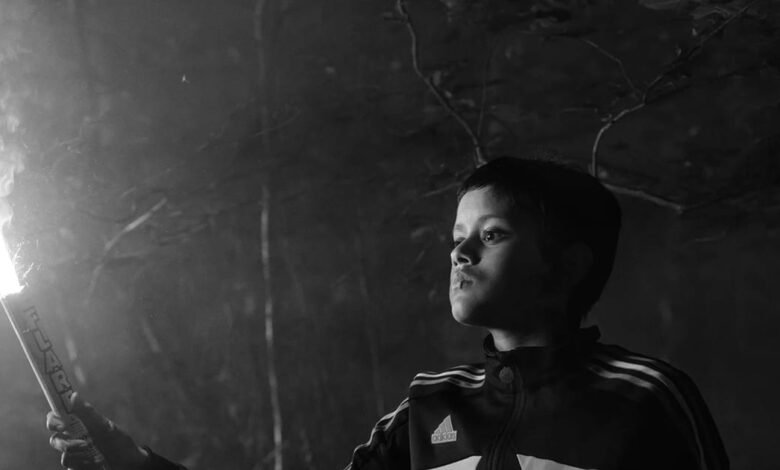

While planes roar overhead on their way to or from the nearby Luton Airport, Ish (Farhan Hasnat) and his best friend Maram (Yahya Kitana) ride their bikes through the suburbs in search of summer diversions. As the holidays stretch out in front of them so too do their imaginations; in the scrubland they build a den out of branches, and in the woods they pick fresh blackberries, delighting in their haul as they gleefully carry them back in Ish’s t‑shirt. But life seems to constantly encroach on their dreamland; while Ish comes to terms with the recent death of his mother, Maram, who is Palestinian, contends with the Israeli occupation and assault on Gaza. Both boys would prefer to just muck about and pretend everything’s fine while they watch TikToks and playfully tease each other, but they soon aren’t presented with much of a choice.
Imran Perretta, a multimedia artist, poet and musician making his feature debut with Ish, demonstrates a deft and gentle hand with his young protagonists, who are forced to grow up fast in a society that has been particularly hostile to Muslims since the 9⁄11 attack and the War on Terror emboldened both the government and the public to view them as ‘the other’. Ish and Maram are at first idly aware of this, but the racism they face as non-white children in a British town quickly has very real consequences. While cycling home together one evening, the boys are pursued by the police under their stop and search policy, widely known to disproportionately target black and asian or mixed individuals. While Ish manages to hide, Maram is bundled into the back of a police van. When he emerges, clearly traumatised, he feels understandably betrayed by Ish. Of course neither boy is in the wrong here – Ish is younger, smaller and just as scared as Maram, and Maram hasn’t done anything wrong. It’s a pertinent example of institutional racism all but given a mandate in the United Kingdom.
Get more Little White Lies
Their friendship changes after this. Maram starts hanging with his older friends and is furious at Ish for abandoning him. Ish struggles with the sudden loss of his best mate and the strange environment at home, where his sister has been forced to shoulder more responsibility since their mother’s death and his father is working all the time, compassionate but nearly invisible. Meanwhile, news of Israel’s continued violence against Palestine is heard in snippets – both material and ancestral home are hostile to Maram, and on the periphery is Ish, too younf to fully comprehend the gravity of the situation while still trying to cope with his own grief. It makes perfect sense that he’s happier to retreat into simpler pleasures in a world where children never stay children very long, particularly given the adultification of non-white kids.
Writer, director and composer Perretta makes the leap to film director with impressive ease, his vision confident and compassionate, echoing the work of Shane Meadows in its sensitive but never condescending portrait of childhood from a child’s point of view. This is undoubtedly made possible by the astonishingly thoughtful performances of newcomers Hasnat and Kitana, absolute naturals on screen in their cheeky, precocious way. Perhaps most crucially, Ish and Maram aren’t presented as saints; they’re flawed and flippant, as all kids are. But there’s a specificity to Perretta’s film, speaking directly to the experience of young Asian and Muslim men in England particularly since the millennium.
It’s also worth mentioning Perretta’s excellent, exuberant score, which compliments the excitement of its young characters. The only stylistic choice wish doesn’t quite gel is the decision to shoot Ish in black and white; the vibrancy of Ish’s world seems to beg for colour, and it feels like a choice at odds with the energy of the film. Yet Ish heralds the arrival of strong talent both behind and in front of the camera, presenting a fresh moving account of contemporary British childhood.
Yet it’s also difficult to watch Ish and not think of the children and teenagers of Palestine, thousands of whom have been murdered by the Israeli state and will never have the chance to experience a safe and happy adolescence. Ish aches with this thought; the deep parallel between the persecution of Palestinians in Israel and Muslims in the United Kingdom. These children are forced to grow up fast and the fleeting innocence of making dens and play fighting with your mates at the local fair seems a million miles away.




